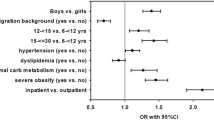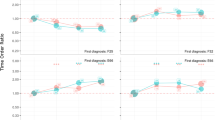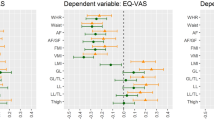Abstract
Objective:
Findings concerning the association of obesity and mental disorders are inconsistent. The present epidemiological study investigates adjusted 4-week, 12-month, and lifetime prevalence rates of mental disorders in obese individuals compared with physically healthy probands and overweight individuals. Correlates of the associations are examined.
Methods:
Prevalence rates were calculated from two large epidemiological surveys from both the general population of Germany and inpatient centers. The surveys investigated subjects with obesity (n=910) and overweight (n=1550), as well as physically healthy probands (n=495). The prevalence rates were based on the Munich-composite international diagnostic interview, a standardized interview for the assessment of mental disorders. Correlates of mental disorders in obese individuals were assessed using self-report questionnaires and medical examinations.
Results:
The adjusted odds ratios (OR) of obese inpatients and obese patients from the general population were significantly elevated in comparison with healthy probands for the 4-week (OR: 2.2; 2.3), 12-month (OR: 1.8; 2.7) and lifetime (OR: 1.4; 2.0) periods. Prevalence rates of overweight individuals were below those of obese individuals. Mood, anxiety and somatoform disorders were most frequent. In particular, sex, marital status and comorbid musculoskeletal diseases proved to be correlates of an increased risk for mental disorders in obese individuals. The presence of comorbid mental disorders was associated with significantly increased health care use and lower quality of life.
Conclusions:
There is a strong relationship between obesity and mental disorders. A future task is to improve care of mental disorders in patients with obesity.
This is a preview of subscription content, access via your institution
Access options
Subscribe to this journal
Receive 12 print issues and online access
$259.00 per year
only $21.58 per issue
Buy this article
- Purchase on Springer Link
- Instant access to full article PDF
Prices may be subject to local taxes which are calculated during checkout
Similar content being viewed by others
References
Baumeister H, Härter M . Somatoform disorders in patients with musculoskeletal and cardiovascular diseases in comparison to the general population. Acta Neuropsychiatr 2003; 15: 192–198.
Härter M, Baumeister H, Reuter K, Jacobi F, Höfler M, Bengel J et al. Mental Disorders in Patients with Chronic Somatic Diseases in Comparison with Healthy Probands. Psychother Psychosom, in press.
Von Korff M, Crane P, Lane M, Miglioretti L, Simon G, Saunders K et al. Chronic spinal pain and physical – mental comorbidity in the United States: results from the national comorbidity survey replication. Pain 2005; 113: 331–339.
Wells KB, Golding JM, Burnam MA . Affective, substance use, and anxiety disorders in persons with arthritis, diabetes, heart disease, high blood pressure, or chronic lung conditions. Gen Hosp Psychiatry 1989; 11: 320–327.
Tiemeier H, van Dijck W, Hofman A, Witteman JCM, Stijnen T, Breteler MM . Relationship between atherosclerosis and late-life depression: the Rotterdam study. Arch Gen Psychiatry 2004; 61: 369–376.
Honda K, Goodwin R . Cancer and mental disorders in a national community sample: findings from the National Comorbidity Survey. Psychother Psychosom 2004; 73: 235–242.
Carpenter KM, Hasin DS, Allison DB, Faith MS . Relationship between obesity and DSM-IV major depressive disorder, suicide ideation, and suicide attempts: results from a general population study. Am J Pub Health 2000; 90: 251–257.
Onyike CU, Crum RM, Lee HB, Lyketsos CG, Eaton WW . Is obesity associated with major depression? Results from the third national health and nutrition examination survey. Am J Epidemiol 2003; 158: 1139–1147.
Roberts RE, Kaplan GA, Shema SJ, Strawbridge WJ . Are the obese at greater risk for depression? Am J Epidemiol 2000; 152: 163–170.
Becker ES, Margraf J, Türke V, Soeder U, Neumer S . Obesity and mental illness in a representative sample of young women. Int J Obes 2001; 25: S5–S9.
Heo M, Pietrobelli A, Fontaine KR, Sirey JA, Faith MS . Depressive mood and obesity in US adults: comparison and moderation by sex, age and race. Int J Obesity 2006; 30: 513–519.
Herva A, Laitinen J, Miettunen J, Veijola J, Karvonen JT, Laksy K et al. Obesity and depression: results from the longitudinal Northern Finland 1966 Birth Cohort Study. Int J Obesity 2006; 30: 520–527.
John U, Meyer C, Rumpf H-J, Hapke U . Relationships of psychiatric disorders with overweight and obesity in an adult general population. Obes Res 2005; 13: 101–109.
Lamertz CM, Jacobi C, Yassouridis A, Arnold K, Henkel AW . Are obese adolescents and young adults at higher risk for mental disorders? A community survey. Obes Res 2002; 10: 1152–1160.
Kuskowska-Wolk A, Bergstrom R, Bostrom G . Relationship between questionnaire data and medical records of height, weight and body mass index. Int J Obes Relat Metab Disord 1992; 16: 1–9.
Jacobi F, Wittchen HU, Müller N, Hölting C, Sommer S, Lieb R et al. Estimating the prevalence of mental and somatic disorders in the community: aims and methods of the German National Health Interview and Examination Survey. Int J Methods Psychiatr Res 2002; 11: 1–18.
Jacobi F, Wittchen H-U, Hölting C, Höfler M, Pfister H, Müller N et al. Prevalence, co-morbidity and correlates of mental disorders in the general population: Results from the German Health Interview and Examination Survey (GHS). Psychol Med 2004; 34: 597–611.
Üstün TB, Sartorius N . Mental Illness in General Health Care. John Wiley & Sons: Chichester, 1995.
Goldberg D, Williams P . A User's Guide to the General Health Questionnaire. NFER-Nelson: Windsor, 1988.
Härter M, Reuter K, Weisser B, Schretzmann B, Aschenbrenner A, Bengel J . A descriptive study of psychiatric disorders and psychosocial burden in rehabilitation patients with musculoskeletal diseases. Arch Phys Med Rehabil 2002; 83: 461–468.
Wittchen HU, Lachner G, Wunderlich U, Pfister H . Test-retest reliability of the computerized DSM-IV version of the Munich-Composite International Diagnostic Interview (M-CIDI). Soc Psychiat Psychiatr Epidemiol 1998; 33: 568–578.
Wittchen HU, Robins LN, Cottler LB, Sartorius N, Burke JD, Regier D, the participants of the WHO/ADAMHA field trials. Cross-cultural feasibility, reliability and sources of variance of the Composite International Diagnostic Interview (CIDI) – Results of the multicenter WHO/ADAMHA field trials (Wave I). Br J Psychiatry 1991; 159: 645–653.
Bullinger M . German translation and psychometric testing of the SF-36 health survey: preliminary results from the IQOLA project. Soc Sci Med 1995; 41: 1359–1366.
StataCorp. Stata Statistical Software, release 9.0 College Station. Stata Corporation: TX, 2005.
Bender R, Lange S . Adjusting for multiple testing – when and how? J Clin Epidemiol 2001; 54: 343–349.
Vineis P . The history of bias. Soz Präventivmed 2002; 47: 156–161.
McElroy SL, Kotwal R, Malhotra S, Nelson EB, Keck PE, Nemeroff CB . Are mood disorders and obesity related? A review for the mental health professional. J Clin Psychiatry 2004; 65: 634–651.
Andrews G, Henderson S . Prevalence, comorbidity, disability and service utilisation – overview of the Australian National Health Survey. Br J Psychiatry 2001; 178: 145–153.
Bijl RV, Ravelli A, Zessen G van . Prevalence of psychiatric disorder in the general population: results of the Netherlands Mental Health Survey and Incidence Study (NEMESIS). Soc Psychiatry Psychiatr Epidemiol 1998; 33: 587–595.
Kessler RC, McGonagle KA, Zhao S, Nelson CB, Hughes M, Eshleman S et al. Lifetime and 12-month prevalence of DSM-III-R psychiatric disorders in the United States: Results from the National Comorbidity Survey. Arch Gen Psychiatry 1994; 51: 8–19.
Faith MS, Matz PE, Jorge MA . Obesity-depression associations in the population. J Psychosom Res 2002; 53: 935–942.
Ranga K, Krishnan R . Psychiatric and medical comorbidities of bipolar disorder. Psychosom Med 2005; 67: 1–8.
Stunkard AJ, Faith MS, Allison KC . Depression and Obesity. Biol Psychiatry 2003; 54: 330–337.
Baumeister H, Balke K, Härter M . Psychiatric and somatic comorbidities are negatively associated with quality of life in physically ill patients. J Clin Epidemiol 2005; 58: 1090–1100.
Baumeister H, Härter M . Auswirkungen komorbider psychischer Störungen bei chronischen körperlichen Erkrankungen. Z Med Psychol 2005; 14: 175–189.
Bertakis KD, Azari R . Obesity and the use of health care services. Obes Res 2005; 13: 372–379.
Kessler RC, Demler O, Frank RG, Olfson M, Pincus HA, Walters EE et al. Prevalence and treatment of mental disorders, 1990 to 2003. New Engl J Med 2005; 352: 2515–2523.
Brugha TS, Bebbington PE, Singleton N, Melzer D, Jenkins R, Lewis G et al. Trends in service use and treatment for mental disorders in adults throughout Great Britain. Br J Psychiatry 2004; 185: 378–384.
Baumeister H, Höfler M, Jacobi F, Wittchen H-U, Bengel J, Härter M . Psychische Störungen bei Patienten mit muskuloskelettalen und kardiovaskulären Erkrankungen im Vergleich zur Allgemeinbevölkerung. Z Klin Psychol Psychother 2004; 33: 33–41.
Hiller W, Rief W . Why DSM-III was right to introduce the concept of somatoform disorders. Psychosomatics 2005; 46: 105–108.
Mayou R, Kirmayer LJ, Simon G, Kroenke K, Sharpe M . Somatoform Disorders: time for a new approach in DSM-V. Am J Psychiatry 2005; 162: 847–855.
Barsky AJ, Orav EJ, Bates DW . Somatization increases medical utilization and costs independent of psychiatric and medical comorbidity. Arch Gen Psychiatry 2005; 62: 903–910.
Public Use File BGS9. Bundes-Gesundheitssurvey 1998 – Zusatzsurvey ‘Psychische Störungen’. Max-Planck-Institut für Psychiatrie: München, 2000.
Public Use File Bundes-Gesundheitssurvey 1998. Robert Koch-Institute: Kernsurvey, 2000.
Acknowledgements
This work resulted from the research project ‘Epidemiology of Mental Disorders in Medical Rehabilitation’ (Grant 01 GD 9802/4 and 01 GD 0101) of the Freiburg/Bad Säckingen Rehabilitation Network (Principal Investigators: M Härter and J Bengel). The project was supported by the Federal Ministry of Education and Research (BMBF) and by the Federation of German Pension Insurance Institutes (VDR).
The authors thank the Max-Planck Institute for Psychiatry and the Department of Psychology and Psychotherapy of the TU Dresden for providing the GHS-MHS survey data43 and the Robert Koch Institute for providing the GHS-CS survey data.44
Author information
Authors and Affiliations
Corresponding author
Rights and permissions
About this article
Cite this article
Baumeister, H., Härter, M. Mental disorders in patients with obesity in comparison with healthy probands. Int J Obes 31, 1155–1164 (2007). https://doi.org/10.1038/sj.ijo.0803556
Received:
Revised:
Accepted:
Published:
Issue Date:
DOI: https://doi.org/10.1038/sj.ijo.0803556
Keywords
This article is cited by
-
Diminished Inhibitory Control in Adolescents with Overweight and/or Substance Use: an ERP Study
International Journal of Mental Health and Addiction (2022)
-
Implicit Attitudes Towards Weight, One’s Own Body and its Relation to Food in Women with Overweight and Obesity
Cognitive Therapy and Research (2022)
-
Does the Selection of the Procedure Impact the Return to Work in Unemployed Patients Undergoing Bariatric Surgery?
Obesity Surgery (2022)
-
Long term high fat diet induces metabolic disorders and aggravates behavioral disorders and cognitive deficits in MAPT P301L transgenic mice
Metabolic Brain Disease (2022)
-
Psychische Komorbidität bei Adipositas
CardioVasc (2020)



